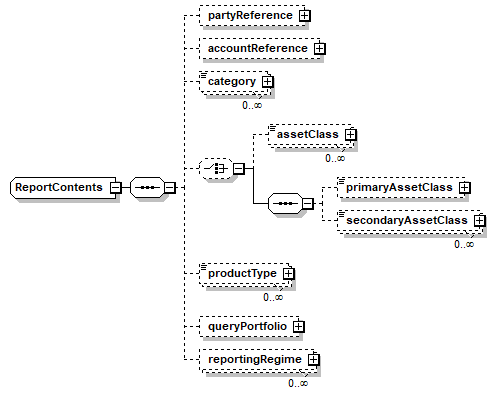
Namespace: |
|
Content: |
complex, 9 elements |
Defined: |
globally in fpml-valuation-reporting-5-10.xsd; see XML source |
Includes: |
definitions of 9 elements |
Used: |
at 12 locations |

XML Representation Summary |
|||||
<...> |
|||||
|
|||||
</...> |
|||||
|
<xsd:sequence>
<xsd:element minOccurs="0" name="partyReference" type="PartyReference"/>
</xsd:sequence>
<xsd:choice minOccurs="0">
<xsd:element maxOccurs="unbounded" minOccurs="0" name="assetClass" type="AssetClass"/>
</xsd:choice>
<xsd:sequence>
</xsd:sequence>
<xsd:element maxOccurs="unbounded" minOccurs="0" name="reportingRegime" type="ReportingRegimeIdentifier"/>
</xsd:complexType>
|
Type: |
AccountReference, empty content |
Type: |
AssetClass, simple content |
|
xsd:normalizedString
|
maxLength: |
255
|
minLength: |
0
|
Type: |
TradeCategory, simple content |
|
xsd:normalizedString
|
maxLength: |
255
|
minLength: |
0
|
Type: |
PartyReference, empty content |
Type: |
AssetClass, simple content |
|
xsd:normalizedString
|
maxLength: |
255
|
minLength: |
0
|
Type: |
ProductType, simple content |
|
xsd:normalizedString
|
maxLength: |
1023
|
minLength: |
1
|
Type: |
QueryPortfolio, complex content |
Type: |
ReportingRegimeIdentifier, complex content |
|
<xsd:element maxOccurs="unbounded" minOccurs="0" name="reportingRegime" type="ReportingRegimeIdentifier"/>
|
Type: |
AssetClass, simple content |
|
xsd:normalizedString
|
maxLength: |
255
|
minLength: |
0
|
|
XML schema documentation generated with DocFlex/XML 1.10b5 using DocFlex/XML XSDDoc 2.8.1 template set. All content model diagrams generated by Altova XMLSpy via DocFlex/XML XMLSpy Integration.
|